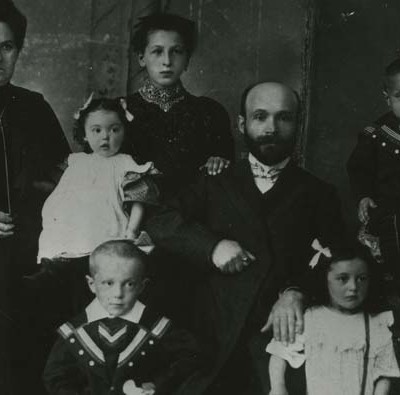
Max Azen (1870-1943) immigrated to Pittsburgh from Kovna, Lithuania, in 1906 with his wife, Bessie (c.1874), their eight children, Rebecca, Morris, Anna, Isadore, Louis, Freda, Hyman, and Yetta, and her mother, Fannie Jacobson. In Pittsburgh, they had four more children, Rose, Phillip, Samuel and Harry. They chose Pittsburgh because an uncle, Solomon Jacobson, had previously settled in the region. Jacobson met them at Penn Station. “Six year old Louis never forgot the humiliating calls ‘Greenie, Greenie’ as the horse pulled the wagon to the Jacobson house on the Bluff,” Harry Azen later recalled.
Azen had been a traveling fur salesmen in Lithuania. In Pittsburgh, he briefly peddled dry goods before establishing a clothing business on Fifth Avenue. He made shirts and dresses and became well known as a furrier. He moved his business onto Penn Avenue in downtown. As the business grew, his sons again moved the business into the former Monongahela National Bank building at Sixth and Wood Streets, which is currently home to a Port Authority trolley station and the Wood Street Galleries. His sons then expanded the business into the suburbs starting in the 1960s. They closed the business in 1981.
The family moved to East Liberty in 1920. “It didn’t take me long to realize that there was something that is very essential to the life of a Jewish community lacking,” Max Azen wrote in the Jewish Criterion in 1923. “I wondered time and again, how it was possible that in a section where so many well-to-do, and God-loving Jewish families resided, there should be no house of worship, no House of God. I wondered how these self-respecting Jews could be content with the make-shift arrangement of hiring some hall or auditorium, in which to congregate and hold most-sacred services of our Holidays, and days of atonement.” As chairman of the B’nai Israel Congregation building committee, Azen selected architect Henry Hornbostle and his student Alexander Sharove to design a synagogue on North Negley Avenue.
A month before his death, Azen and four of his sons established the Max Azen Foundation, a nonsectarian charity for individuals and for educational, charitable and religious organizations.
His granddaughter, Corinne Azen Krause (b.1927), earned an economics degree from the University of Michigan and a history degree from Carnegie Mellon University before earning a Ph.D. in history from the University of Pittsburgh. Over the course of her career, she taught history at Taylor Allderdice and Schenley High Schools, Carnegie Mellon University, the University of Pittsburgh, and Carlow and Chatham Colleges. Among her many works were the oral history project of three generations of Pittsburgh women of Italian, Jewish, and Slavic descent that resulted in a book titled Grandmothers, Mothers, and Daughters, as well as other scholarly writings; a biography of the industrialist and philanthropist Isaac W. Frank; and Roots and Branches, an interpretive exhibition of the history of the Jewish communities of Pittsburgh.
She is a founding member of the Rauh Jewish Archives Advisory Committee, a founder of Jewish Residential Services, and a life member of the board of the Pittsburgh Chapter of the American Jewish Committee.